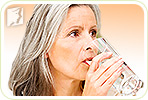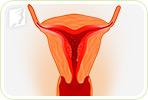Life after menopause can be difficult to adjust to. Many women feel saddened during this physical transition, but really a new life stage is just beginning. Many women find that postmenopause is easier to deal with than menopause, and that it can be a liberating stage of life. With menopause came a lot of symptoms and difficult physical changes. Symptoms after menopause are few, but distinguishable. Keep reading to find out about postmenopause symptoms.
Am I in Postmenopause?

When a woman has not had her period for over a year, then she has reached menopause. From this moment on, she is in the postmenopause stage. It is advisable for a woman to consult her doctor in order to confirm that menopause has taken place: a blood test will be administered to check the level of FSH follicle stimulating hormone (FSH) in the body.
In the lead-up to menopause, estrogen and progesterone levels fluctuate constantly, leading to disruptive menopause symptoms. During postmenopause, these symptoms often reduce in severity. Hot flashes, headaches, and other pain should pass; however, there is a higher risk of developing disorders such as osteoporosis.
Symptoms of Postmenopause
Here is a list of common menopausal symptoms that may begin or continue during postmenopause:
- Vaginal dryness. Reduced estrogen levels lead to drier and thinner vaginal walls.
- Urethritis. Also known as bladder or urethra infection, this is common among menopausal women because the lining of the bladder and urethra thin due to declining estrogen levels, and become more susceptible to infection.
- Incontinence. Laughing, sneezing, or lifting objects can induce urine incontinence, or leaking.
- High blood pressure. Also known as hypertension, this condition affects women more after menopause because of a combination of hormonal changes, and an often increased body mass index (BMI) due to menopausal weight gain.

- Joint pain. Reduced estrogen levels after menopause can reduce bone density, increasing the risk of developing osteoporosis.
Treatments for Postmenopause Symptoms
Certain lifestyle changes can help the mind and body transition into postmenopause. Eating a healthy diet and getting plenty of exercise is important when entering this new life stage. Eating the right foods and exercising regularly can reduce the severity of postmenopause symptoms, and can help prevent certain health conditions such as heart disease and osteoporosis.
Some alternative medicines are known to help with postmenopause symptoms. Whether it be natural supplements, aromatherapy, or other types of alternative medicine, women often find a method that works for them.
If you are experiencing pain or are experiencing signs of any of the conditions listed above, talk to your doctor. Your doctor can help you find a solution for your postmenopause symptoms. Click on the following link to find out more about treatments for postmenopause symptoms that will work for you.
Sources
- BMJ Group. "Menopause: What is it?" Patient Leaflet. 2007.
- Hopkins, Virginia. Lee, John R. M.D. What Your Doctor May Not Tell You About Menopause. New York: Warner Books Inc., 1996.
- Love, Susan M.D. Menopause and Hormone Book. New York: Three Rivers Press, 2003.
- Martin, Raquel. The Estrogen Alternative. Rochester, VT: Healing Arts Press, 2000.



